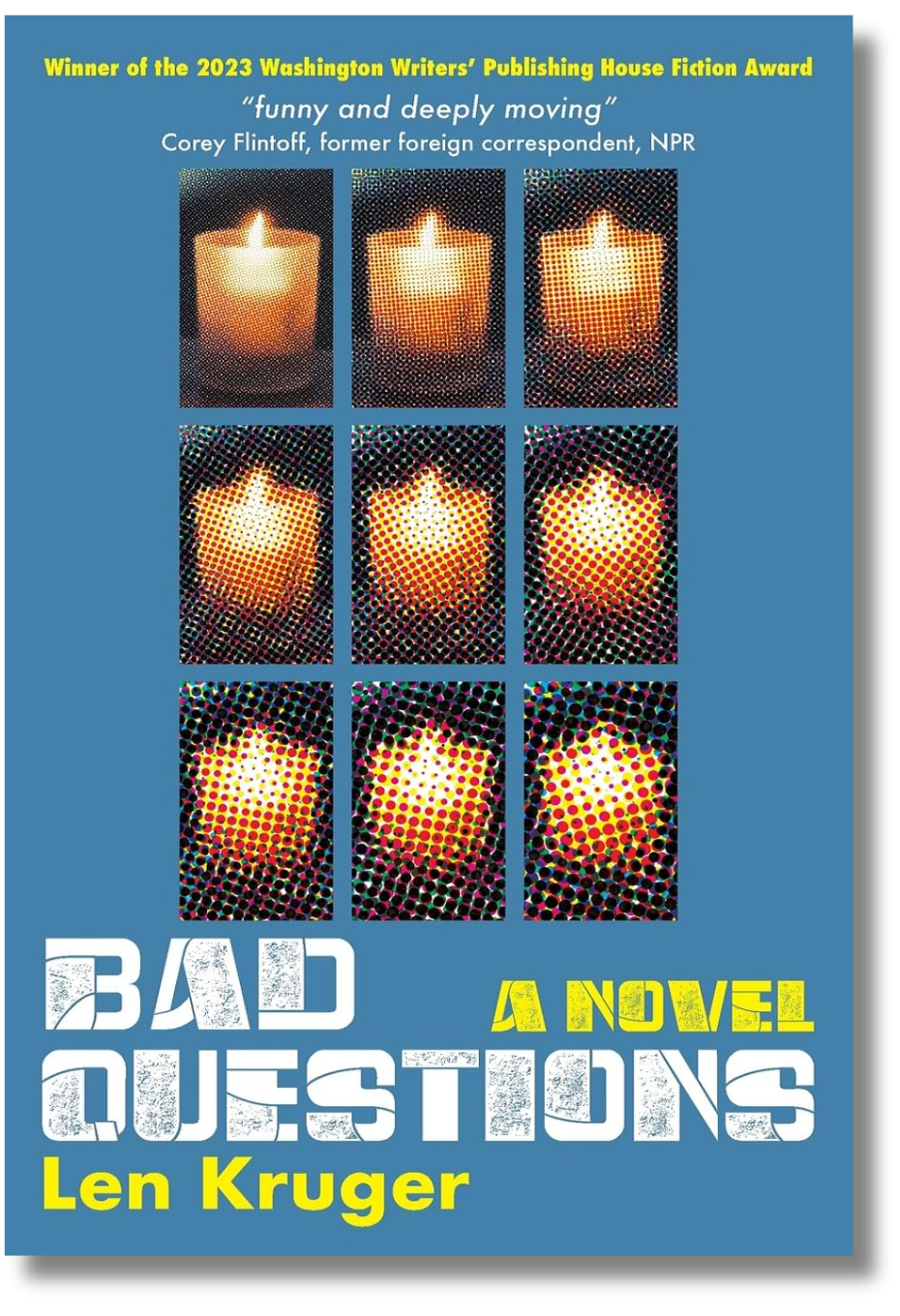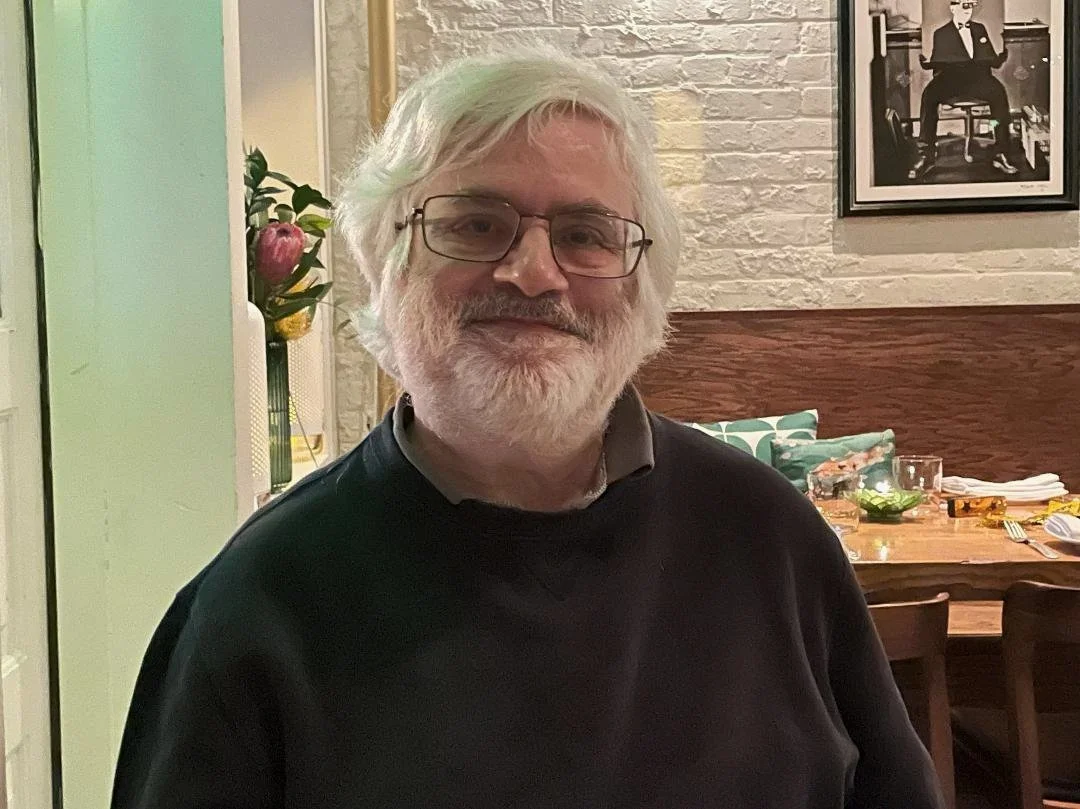Washington Writers Publishing House Winner: Len Kruger's Debut 'Bad Questions'
Review by Samantha Neugebauer
Finishing a good coming-of-age novel can provoke a similar response to being asked a well-crafted, open-ended question. First, you feel the respect of the author/asker for you, and in turn, you respect them and their work even more. Second, you might grapple with the challenge of responding, feeling overwhelmed by the quest for the right words or the correct answer. Finally, though you attempt to articulate your feelings, you realize whatever ideas you express will likely fall short due to the inherent complexity of good novels (and questions) that foster introspection and further questions. Perfectly capturing this dynamic is Len Kruger’s debut novel Bad Questions, a compelling coming-of-age story.
Bad Questions is the winner of the 2023 Washington Writers’ Publishing House Fiction Award. The Washington Writers Publishing House is a nonprofit organization that has published over 50 volumes of poetry since 1975, and now sponsors three annual competitions for writers living in the DMV, publishing the winning full-length books of poetry, fiction, and nonfiction. Kruger lives in D.C. and holds an MFA from the University of Maryland. Like the protagonist of his novel, he grew up in Silver Spring and Rockville during the ‘60s and ‘70s.
“'I’m sure he misses you,' she said, nodding sadly. What did that mean? My dad was dead. How could he miss anyone?”
Set in the D.C. suburbs in 1971, Bad Questions follows a year in the life of twelve-year-old Billy Blumberg, who is adrift after his father’s death by suicide. After “the accident,” as his mother calls it, she and Billy relocate to a more affordable apartment in a nearby suburb, forcing Billy to restart the seventh grade in a different school district, where an awkward guidance counselor keeps an eye on him. Another adult also takes a special interest in Billy: Ms. Marvin, Billy’s former sixth-grade teacher, who not only appears at his father’s shiva but seeks Billy out at his new school one afternoon and takes him home with her too. Like Lise, the protagonist of Murial Spark’s The Driver's Seat, Ms. Marvin’s strange demeanor and behavior are equal parts mesmerizing and alarming. For a good portion of the novel, her actions are inexplicable. Like Billy, you can’t help but question her motives, or, as he says after Ms. Marvin extends her friendship, “Why would I want to be friends with Ms. Marvin? It would be like becoming friends with the mailman or my dentist.”
Author Len Kruger
But Ms. Marvin’s friendship isn’t the only thing confusing Billy. The novel’s title speaks to Billy’s inquisitive nature and hints at his propensity for asking questions, though not always the right ones or the most interesting ones. At times, Billy is like a malfunctioning metal detector, unable to sense the changes in the electromagnetic field when he passes over metal objects–he doesn’t read people well. Then again, he is only twelve years old and experiencing grief over the loss of his father and guilt over the possibility that he somehow contributed to his father’s unhappiness. On top of this, he is also experiencing the universal blows of tweendom: unrequited crushes, cooler classmates, group projects, and burgeoning self-awareness. Moreover, Billy’s mother insists he needs to prepare for his bar mitzvah, which is especially delicate because his father was a Hebrew school principal.
“I decided that a mimeograph machine clacking was the fourth loneliest sound in the world, behind the sound of a distant lawn mower, the scratching of leaves being raked, and the sound of uproarious laughter from far away.”
While there are numerous touching and unexpectedly humorous moments in Bad Questions, what really stands out is the novel’s structure. Kruger writes an effective prologue and epilogue, introducing us to an older, wiser Billy, a Billy who has been molded by the profound questions he once posed and has evolved into a scientist who now makes a living by asking interesting questions. Outside of these introductory and concluding sections, Kruger steers clear of retrospective narration, effectively removing the influence of hindsight on the majority of Billy’s narrative, enabling Bad Questions to be a truly immersive journey. Additionally, each individual chapter also shifts between different points in time, but exclusively within the confines of the year 1971 or earlier, giving readers glimpses into the special relationship Billy shared with his father before his death. This structure also keeps the novel moving at a pretty fast clip, given its subject matter.
Adult readers who grew up in the late sixties and seventies will relish in the novel’s abundance of memorabilia: Mad Magazine, Ali MacGraw, the Chicago Seven, etc. For those of us born after Watergate, Kruger gives us another glimpse into how much the world has changed and how much it has stayed the same. Moreover, if you’re a fan of the movie Now and Then, chances are you'll delight in the ways Kruger's book delves into how characters seek out supernatural explanations in the face of loss and unexplainable events. Of course, nowadays, Google could answer some of Billy’s more tedious, closed-ended questions. Nevertheless, machines, as of yet, still can’t answer or ask the good ones, not the way a coming-of-age novel can, not the way Bad Questions does.
You can support this independent press by buying your copy of Bad Questions from Bookshop.
Upcoming appearance for Len Kruger
Saturday February 24 at Solid State Bookstore
Check Len Kruger’s website for updates and more information about this author: www.lenkruger.com
For more from WWPH: they publish a bi-weekly literary magazine called WWPH Writes. The press has also just announced the 2024 winners of their annual contests for full-length fiction, poetry, and nonfiction books. These winners will be published by WWPH.
Len Kruger lives in Washington, D.C. His novel, Bad Questions, was the winner of the 2023 Washington Writers’ Publishing House Fiction Award. His short fiction has appeared in Zoetrope-All Story, The Barcelona Review, The Potomac Review, and Gargoyle, among others. He is a graduate of the MFA Program at the University of Maryland.
Samantha Neugebauer is based in Washington, D.C., where she is a lecturer at NYU in D.C.


